Iran Calls Seoul's Donation Of Covid Masks A 'Joke', While $7 Billion Frozen
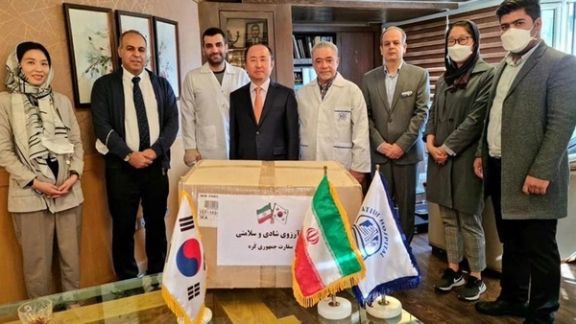
Iranians are criticizing the South Korean embassy in Tehran for donating 2,000 Covid masks to a hospital while Seoul keeps $7 billion of Iran’s frozen funds.

Iranians are criticizing the South Korean embassy in Tehran for donating 2,000 Covid masks to a hospital while Seoul keeps $7 billion of Iran’s frozen funds.
Ambassador Yun Kang-hyeon visited a private hospital in Tehran on Sunday and donated Covid masks, in what conservative media in Iran and several prominent citizens criticized as an insensitive act.
Some media outlets called the ambassador’s donation a “humiliating act” as Seoul has refused to release $7 billion of Iran’s money frozen by two of its banks, since the US imposed banking sanctions on Iran in 2018.
The embassy tweeted pictures of the ambassador’s visit to the hospital showing a few cartons of masks. This led to negative reactions, with Alef conservative website not only criticizing the embassy but also attacking the private hospital for accepting the gift.
“Is anyone in this hospital reading newspapers or following the news to know what South Korea has done to us during sanctions?”, the newspaper asked.
Iran foreign ministry spokesman Saeed Khatibzadeh also reacted to the news on Monday calling the donation “a joke”.
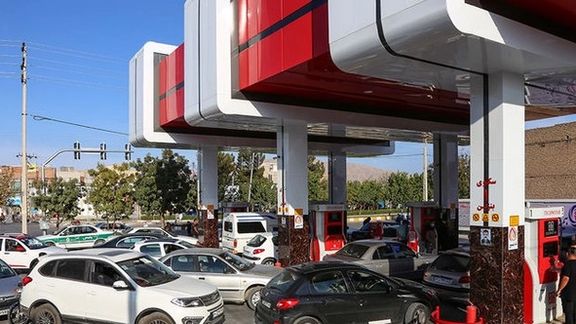
Almost a week after a major disruption at more than 4,000 gas stations in Iran, officials say it is not clear whether it was a cyberattack or sabotage in Iran.
Since October 26, Iran has been trying to fix a payment system at all gas station nationwide that suddenly broke down, creating a major disruption. The system provides a limited amount of cheap, subsidized fuel to every citizen and the without it, people have only one option, paying double for freely sold fuel.
Officials and local media initially said it was a cyberattack, but that raised questions, since reportedly the payment system is not connected to the Internet.
By Monday, 20 percent of all locations still could not sell the cheaper gas, as gas stations were gradually coming back to full operations.
The spokesman of parliament’s security committee, Mahmoud Abbas Meshkinzadeh, announced Monday that government agencies have not reached a concensus over the cause of the disruption and are not certain if it was a cyberattack from abroad or infiltration and sabotage from within Iran.
Iran International never reported the incident as a proven cyberattack, since there was never independent confirmation and relying only on statements by Iranian officials in a security-related matter would be a mistake.
Meshkinzadeh’s statement about lack of a conclusion came as a top Revolutionary Guard commander, Gholamreza Jalai, in charge of Iran’s civil defense organization said Saturday that analysis showed Israel and the United States were behind the disruption, although no forensic evidence has been found.
“We are still unable to say forensically, but analytically I believe it was carried out by the Zionist regime, the Americans and their agents,” Jalali said.
Meshkinzadeh said that the oil ministry, the intelligence ministry, civil defense officials and others held a meeting at parliament’s security committee to discuss ways to deter cyberattacks, but the overall conclusion was that the cause of the incident with gasoline distribution remained unclear.
He added that infiltration and sabotage is not a far-fetched scenario, and the parliamentary committee will do a more in-depth study and will issue a final report.
Iran has been the subject of mysterious attacks since July 2020 that twice caused explosions in its high-security Natanz uranium enrichment facility, causing major damage. Most observers and major international media outlets, as well as Iranian officials, have pointed fingers at Israel, which routinely neither confirms nor denies such reports.
Another spectacular operation that happened in public and showed the level of alleged Israeli infiltration, was the Hollywood thriller-style assassination of Iran’s top nuclear scientist and official, Mohsen Fakhrizadeh, in November 2020. All accounts eventually said that a sophisticated, remote-controlled machinegun installed in a van parked alongside the road opened fire on Fakhrizadeh’s approaching vehicle, killing him on the spot.
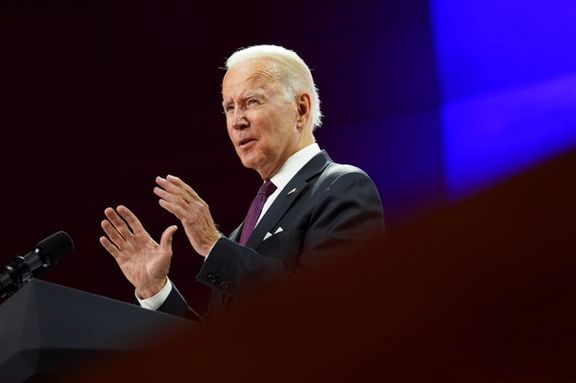
President Joe Biden has said on Sunday that the United States will "respond" to actions Iran has taken against Washington's interests, including drone strikes.
“With regards to the issue of how we’re going to respond to their actions against interest of the US, whether they are drone strikes or anything else, is we’re going to respond,” Biden said in a press conference following the G20 summit in Rome.
A Us base in Syria came under attack recently with drones suspected to have been launched by Iran-backed militias.
Officials said on October 25 that the US believes that Iran resourced and encouraged the attack, but that the drones were not launched from Iran. They were Iranian drones, and Iran appears to have facilitated their use, officials said, speaking on condition of anonymity to discuss details that have not been made public.
Iranian backed militias have also attacked bases hosting US troops in Iraq, recently using drones more often than rockets.
The US Treasury Department on Friday sanctioned two senior members of Iran’s Revolutionary Guard (IRGC) and two affiliated companies for supplying lethal drones to insurgent groups in Iraq, Lebanon, Yemen, and Ethiopia.
Biden's threat comes as the US and its European allies urge Iran to return to nuclear talks aimed at restoring the 2015 Iran deal.
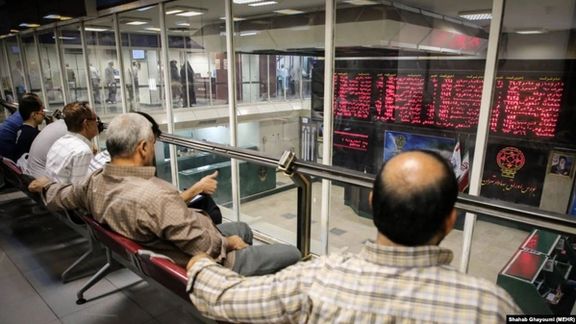
Another big decline in Iran’s stock market on Sunday has highlighted the precarious state of the economy amid uncertainty over the future of nuclear talks.
The Tehran stock market index dropped by about 30,000 points, bringing it close to 1.2 million points, down from more than 1.4 million in early August when President Ebrahim Raisi (Raeesi) took office promising to boost capital markets.
Fararu, a leading news website in Iran, said that economic uncertainty resulting from a lack of progress in nuclear talks with the West is the main reason for the continuous decline of the stock market. An expert in capital markets told the website that there is a lack of investment capital and market lethargy.
The government which faces a huge budget deficit issued more bonds in August, which drained the capital markets. One expert said that the government and the central bank are using the stock market as a source of financing.
At the same time, First Vice President Mohsen Rezaei, who is one of Raisi’s top officials in charge of the economy told parliament on Sunday that the government will never print more money without proper backing, which would mean hard currency reserves. Iran has been spending its reserves to make up for lost oil exports, banned by US sanctions.
Iran has accelerated its money printing since 2018 when the United States withdrew from the 2015 nuclear agreement (JCPOA) and imposed sanctions on Iran. Liquidity has quadrupled since 2017, dragging down the value of the national currency ninefold.
The rial is hovering around 275,000 to the dollar, showing no appetite for appreciation.
While Rezaei was promising a cap on liquidity, hardliners were demanding that the Central Bank of Iran (CBI) not to deny money to an ambitious Raisi project of building one million affordable homes in the next 10 months. Most economists in Iran have called the project an impossible plan, given the fact that it would need $10-15 billion dollars the government does not have.
But Rezaei, who has a military background in the Revolutionary Guard with no economic management experience tried to sound upbeat in his meeting with the parliament. He said people can expect good economic news in December. But what he mentioned were old formulas of more government control over prices and compensating ordinary people who have to endure a 50-percent inflation rate.
He even invited expat Iranian to bring their “intellectual and financial capital back to Iran” and invest in the future. This seems to be another optimistic expectation given the fact that up to $100 billion is said to have left the country in the past decade.
President Raisi’s first three months in office is coming to a close next week with no visible improvement in the economy. Critics already began demanding action instead of words in mid-October, while the president appeared to be issuing daily orders to officials to solve deep-rooted problems that cannot be addressed without the lifting of US sanctions.
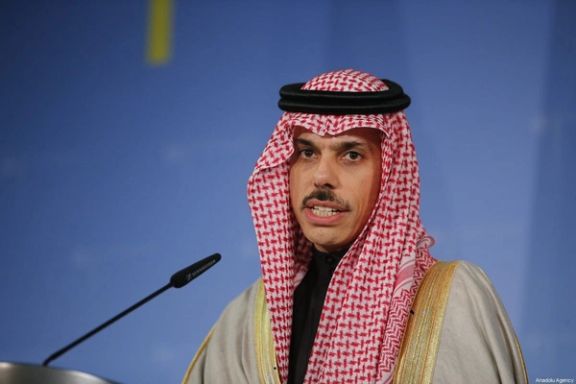
Iran and Saudi Arabia both say that they are willing to continue talks they started in April but not much progress has been made, with embassies still closed.
Iran’s foreign ministry said Sunday that after four rounds of talks with Saudi Arabia, reopening of embassies “will take some time”, after the Saudi foreign minister said not much progress has been made.
The Iranian foreign ministry spokesman Saeed Khatibzadeh was quoted by local media as saying that the two sides have achieved preliminary agreements, but the two countries are waiting for the finalization of the talks.
Saudi Arabia’s Foreign Minister Faisal bin Farhan Al Saud had told CNBS in Rome on Saturday that talks with Iran are continuing but no “solid progress had been made.” He indicated that another round of talks will follow, saying, “We haven’t really reached any conclusive progress. But they have been, I would say, positive enough to allow for further discussion beyond, but nothing concrete as of yet.”
Iran has embarked on a much-touted policy of improving relations with neighbors as it grapples with Western powers over its nuclear program. The West besides asking Iran for a full return to the 2015 nuclear deal (JCPOA), is also raising the issue Tehran’s aggressive policies in the region.
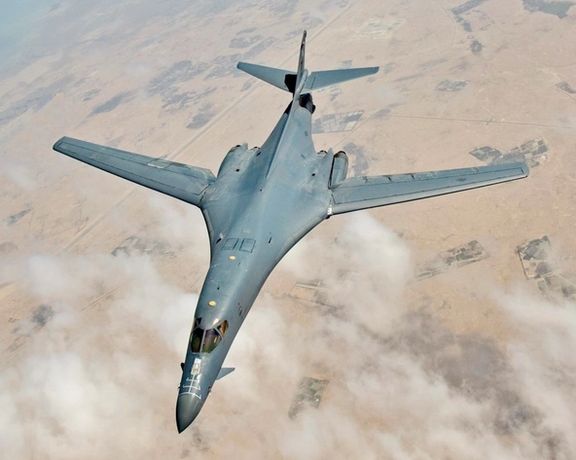
The US Air Force flew a B-1B strategic bomber over key maritime chokepoints in the Middle East with allies, including Israel, amid ongoing tensions with Iran.
The B-1B Lancer bomber flew Saturday over the Strait of Hormuz, the narrow mouth of the Persian Gulf through which 20% of all oil traded passes.
It also flew over the Red Sea, its narrow Bab el-Mandeb Strait and Egypt's Suez Canal.
The Strait of Hormuz has been the scene of attacks on shipping which have been blamed on Iran over recent years, while the Red Sea has seen similar assaults amid an ongoing shadow war between Tehran and Israel.
The Islamic Republic has denied involvement in the attacks, though it has promised to take revenge on Israel for a series of attacks targeting its nuclear program.
Fighter jets from Bahrain, Egypt, Israel and Saudi Arabia flew alongside the bomber.
The flyover is the first in a pattern of such flights by nuclear-capable B-52 bombers since the Trump administration, as a show of force to Iran.
Biden sending a B1-B bomber into the region allows him to send "a clear message of reassurance" to regional allies, the US Air Force's Central Command said in a Twitter post.
Report by AP